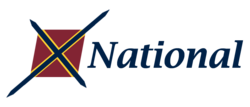National Party (Norden)
This article is incomplete because it is pending further input from participants, or it is a work-in-progress by one author. Please comment on this article's talk page to share your input, comments and questions. Note: To contribute to this article, you may need to seek help from the author(s) of this page. |
National Party Nationalpartiet | |
|---|---|
 | |
| Leader | Magnus Kjærsgaard |
| Speaker | Margret Sveinbergsdóttir |
| Chairman | Oskar Brandt |
| Founder | Ulrik Graversen |
| Founded | 1920 |
| Headquarters | National Party HQ, Nyhavn, Kristianshavn |
| Ideology | Conservatism One-nationism Big-tent |
| Political position | Centre-right |
| Colours | Blue |
| Folkekammer | 142 / 246
|
| Election symbol | |
| Nat | |
The National Party (Dalish: Nationalpartiet), or simply National, is a centre-right conservative political party in Norden. The party, led by Magnus Kjærsgaard since 2014 is currently the largest party within the Folkekammer and the current governing party of the nation.
Formed in 1920 by Ulrik Graversen, the National Party has historically dominated elections within Norden, having won a majority in all-but 5 elections since the implementation of universal suffrage in 1918. Though nominally a conservative party, the National party has traditionally encompassed a relatively wide range of views, particularly in regards to economic policy. In contrast with many other conservative parties throughout Aurorum, the National Party does not maintain a firm commitment to laissez-faire economics, instead advocating for elements of economic interventionism, particularly in regards to natural monopolies. Nevertheless, in terms of social policy, the party is ardently social conservative, opposing the legalisation of gay marriage and upholding the virtues of traditional institutions such as the Nordic Semitar Church.
History
Ideology
Criticism
The National Party has come under sustained criticism in recent years in regard to both its advocacy of stringent social policies, but also what many have labelled as anti-democratic practices.
Whilst the National Party has come under fire for its opposition to LGBT rights, particularly on issues such as same-sex marriage or adoption rights, much of this criticism has been levelled at individual members and MPs rather than the party itself. On numerous occasions sitting members of the Folkekammer have been referred to the Parliamentary Standards Commission for alleged homophobic comments. The most notable incident being when the MP for Kullerby, Mikael Rehn was recorded making homophobic statements in the house towards openly gay member of the Labour party Klara Norström, though following an Parliamentary investigation Mr Rehn only received an official warning. Similarly, individual members of the party have come under criticism for alleged racist or anti-immigrant comments. International observers have also labelled the National Party as being anti-immigrant due to its support of quota-based immigration policies, though the party rejects this label.
The primary form of criticism levelled at the National Party relates to what many have described as anti-democratic practices, which include but are not limited to gerrymandering, voter identification laws, the unelected nature of the Adelskammer, and the usage of state media influence to promote positive coverage. International observers have argued that such issues have led to a considerable democratic deficit within the country, allowing the National Party to dominate the political scene.
The National Party reject these claims, arguing that the independent Boundary Commission is responsible for the drawing of electoral constituencies which are regularly updated to reflect demographic changes, whilst voter identification laws prevent widespread voter fraud. Additionally, the party opposes what it calls "unlawful criticism of the country's free and independent media", arguing that it in no way receives preferential coverage from national broadcasters.